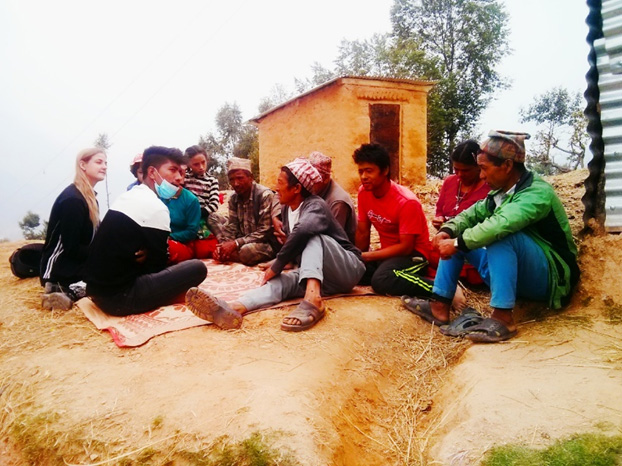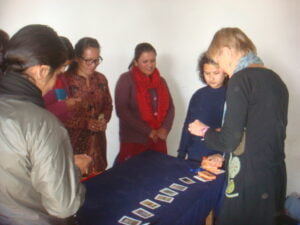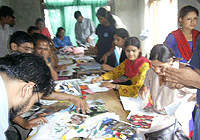
Research Initiative: The ongoing recovery process in Okharpauwa , by VIN Volunteer
A research was conducted by a VIN volunteer to understand the ongoing recovery process in Okharpauwa after 2015 Earthquake. This research Initiative was focused to find out the locals involvement in recovery process and it’s challenges.
24 household interviews, 2 focus group discussions and 1 expert interview have been conducted from the 20th of March to the 5th of April in Okharpauwa, Nepal. The interviews were conducted in nine different wards in Okharpauwa, Nepal.
VIN’s volunteer Christel Öhblom who was the researcher has presented her experience about the research and some superficial findings from it.
“I gained access to the field via the organization VIN: Volunteers Initiative Nepal, who are well known in Okharpauwa for their community work. In Okharpauwa, they are known by the people from the projects of making proper toilets, building temporary shelters after the earthquake and now reconstructing damaged houses from the earthquake.
My gatekeeper and translator Deepak helped me to gain access to the field. He knows the people in Okharpauwa well, especially from his work with VIN and also because he is local. He therefore brought me to the sites and introduced me to potential interviewees.
The interview persons were chosen randomly to get an insight in different people’s opinion about the recovery effort after the 2015 earthquake. My gatekeeper introduced me to potential interviewees, which I mainly accepted, because I wanted the sample to be as random as possible. However, in the middle of the process I realized that we had interviewed a lot of males and young people and I therefore requested more women and elder people, to have as many different viewpoints as possible.
Since I am not native (nepali) speaking I had my gatekeeper to translate for me. There were a few language barriers, especially because there are many techniques in asking the questions to the interviewee that I could not use, since my questions were going through my translator. I especially found it difficult to get the people to talk about emotions. I discovered that the Nepali are mainly more practical-minded and do not waste their time on thinking of their emotions, however there were also a few language barriers. I believe that I could ask the questions myself and understand the answers, the fieldwork would have been even more fruitful than it is now. However, I was aware of this barrier and have taken it into account in accordance to my final results.
I was pleased to experience that the people were more than willing to participate in the interviews. If I wanted I could have done at least 2 or 3 more in each ward, however a pattern quickly showed, and as a single researcher, would it be too much work in accordance to my timeframe. I had one month to conduct 2-3 interviews in 9 wards and transcribe all of them before the 12th of April. My final report is due the 19th of May, which only gives me a month to analyse the findings and review the whole project. So far are the transcriptions approximately 100 pages, which I (single researcher) have to analyse into something useful within one month. I think that I could have settled with 15-20 interviews, mainly because many of the latest interviews did not give me much new information. However, I had decided that I wanted to do interviews in each ward. I mainly chose to do interviews in all the wards because the people living in their respective ward differ, for example: the people living in ward 1 are from one caste (Brahim) and the people living in ward 3 is from another and lower caste. This was clear through my observations and interviews, and I am therefore satisfied with the choice of doing interviews in all the wards.
I was overt whilst conducting all interviews, however I am not sure if the interviewees were aware of the purpose of my research. I believe their main reason for speaking to me, was because I came from VIN, I looked “international” and I therefore might be able to help them rebuilding their homes. I do hope that my project can contribute to the peoples’ ongoing recovery, however it will mainly contribute with recommendations to future recovery programs in Nepal.
Under my field observations was I covert and wrote down my observations every afternoon when I came home from a ward, with the observations fresh in mind. I have observed each interviewee, the wards as much as possible and then the Nepali people in general to get an idea of how their cultural and social behavior. My main observation is: that the Nepali are practical-minded people who will always give you a smile if you give them one.
During the fieldwork, I did not live in Okharpauwa, which I believe could have been more giving to the project, especially because I would be able to observe the participants and the field daily. I visited different wards every day and only had 2-3 hours to observe the people in the field, it could have been nice with more time to observe and get an idea of the peoples’ everyday life today after the earthquake and which families living where.
I must admit, that I am surprised of how easy it was to find interviewees and how willing people were to participate in my research. I believe that it demonstrates two things: firstly, people are genuinely interested in talking to me and they do also have the time for it and secondly, people are desperate to get any kind of help, they hope by sharing their story they might get some help. The first thing demonstrates the kindness and daily life of the Nepali people and sadly but true the second demonstrate that people are really in a position where they need help, there is not much they can do themselves. Many of the interviewees have mentioned that they trust in the government, because they don’t have any other option. Furthermore, when I asked if there was something they wanted to add to the conversation, they always asked for help from either: me, my government or VIN. They are therefore in a current position where they are completely dependent on some kind of help in order to improve their current daily life. Almost all the people I talked to live in temporary shelters, unable to build a new house at the moment, mainly because of economic conditions. I have not finished analyzing my findings and I don’t not have a complete overview of my final project momentarily but I believe that the fieldwork has resulted in new knowledge, both for me as a researcher but also for recovery efforts in general. “



